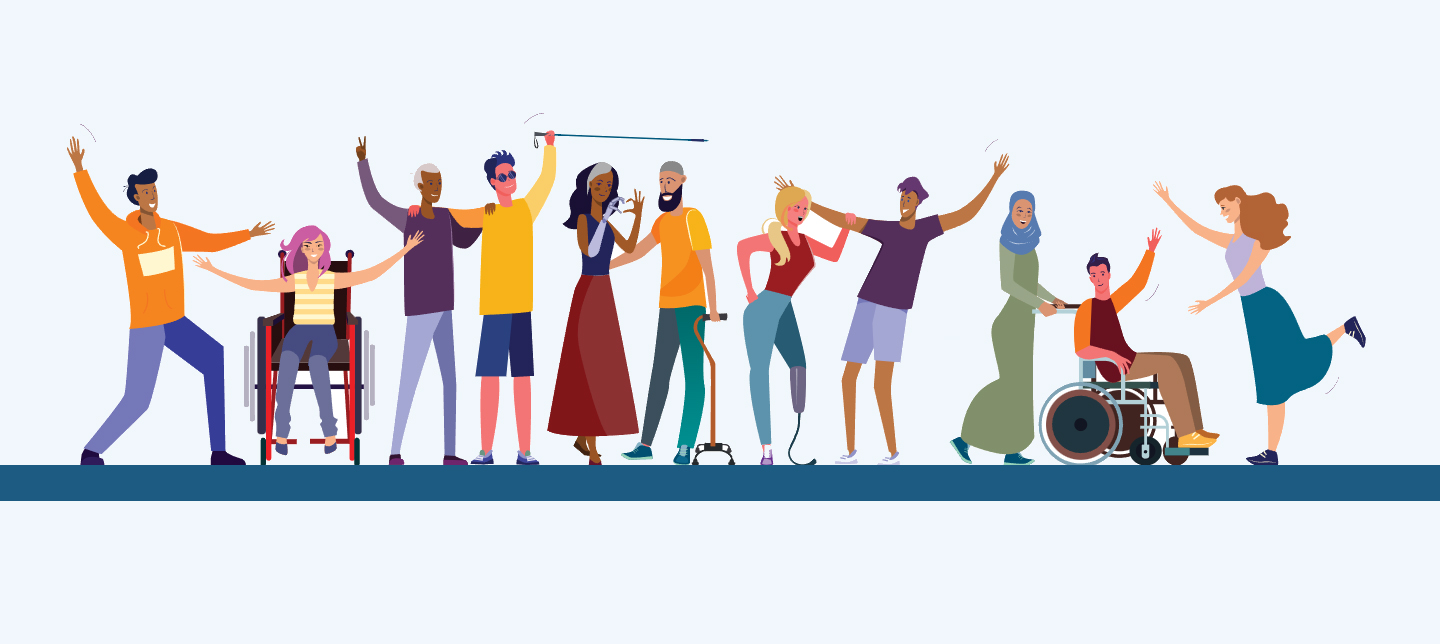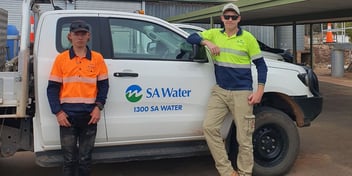Attracting diverse talent and changing lives

When on the journey towards creating more inclusive workplaces, one water sector professional said it’s crucial not to underestimate the value of workplace opportunities for people with a disability – these opportunities, when suitable, can be life changing.
Earlier this year, the Australian Water Association and the Water Services Association of Australia launched Careers in Water, an initiative to increase awareness and attraction of talent to work in water and be part of delivering a sustainable water future.
To celebrate the launch, we caught up with WaterAble Deputy Chair Matt Iversen about his career in the water sector, and what can be done to further foster inclusive workplace cultures for people with a disability.
Currently working at Greater Western Water as a Customer Care Quality Supervisor, Matt said he’s really enjoyed working within the water industry: “For a lot of reasons, it's completely changed my life”.
“I've been on the WaterAble Organising Committee since 2020. I was appointed Deputy Chair earlier this year. It's been one of the great thrills of my career. It's been a wonderful opportunity.”
Matt said water utilities have a powerful ability to represent the best of business, being community centered and not-for-profit driven, which is why they are so well positioned to lead the charge on creating opportunities for people with a disability.
“There's an appetite to do more and to be as inclusive as possible. The buy-in that we've had from the water industry over the last three years since launching WaterAble has been phenomenal,” he said.
“Water organisations are going more now to become more inclusive, and I think that’s admirable”.
“One of my strong interests with WaterAble is trying to get opportunities for other people with a disability to match the opportunities that I've had. It's been hard work, but I feel really fortunate to be given those opportunities”.
“People with a disability are still very much underrepresented across industry in general. But, even in the water sector, it’s trending up, and we want to keep that trend going.”
Journey through illness
Matt said his experience with chronic illness has been a difficult one, not simply because of the impacts on his body, but also because of the restrictions on his ability to find and maintain suitable work.
“I have a condition called Ehlers Danlos Syndrome (EDS), which is something I was born with, but I didn't know about until I was a young adult. It's a connective tissue disorder. It's given me lots of back problems and hip problems,” he said.
“I get herniated discs all the time, as well as dislocated joints. It's something that's dramatically affected my body. It’s degenerative and progressive, so it gets worse every year.
“I found out about it when I was 23 years old. I was in my last year of a carpenter apprenticeship. I always wanted to work in a trade, but my disability prevented me from this – I kept getting injured. And I ended up missing two and a half years of work.”
“In order to adjust, I had to completely change my career plan.
“I didn't know what I was going to do. Just three years earlier, I was headed in the right direction. I was ahead of the curve. But then I got to 25 and was at square one with no real prospects, as all my time had been spent developing a skill set, I could no longer use.
“Since being diagnosed with EDS, my work has always had to revolve around what my body was capable of. It’s been a really difficult challenge and it's not something other people think about often.
“I consider myself lucky. It's unfortunate that I have EDS, but I have a relative level of independence and movement in comparison to other disabilities. I need a cane now, most of the time, but I can still walk around.
“But, at the same time, everything I've done in my career has completely revolved around what my body can do. And as time has progressed, that has changed and meant that I've had to pursue new opportunities when they come up.”
Way into water
After two and a half years managing health issues, Matt re-entered the workforce with a part-time role at an energy utility in Melbourne. While he quickly progressed to full-time hours, the long work days took a big toll on his body.
“I was working nine to five and commuting in. But with an hour on the train each way, the days became very long. It got to the point where I was miserable because of the amount of pain I was in each day,” he said.
“Each weekend, I was bedridden – and that’s not an exaggeration. I was missing my son’s football games; I wasn’t able to help my family around the house or with grocery shopping. I really took those experiences for granted.
“Everyone needs to make money. And I had a young family to support. But I got to the point where I couldn't do it anymore. I was having a lot of body issues. I found out I needed a hip replacement; I was very uncomfortable all the time.
“In 2017, that’s the situation I was in, right before I started with Greater Western Water.”
While Matt had developed a new skill set in utilities’ customer care, he knew he needed to find work closer to home.
“I also knew that I needed to go part-time to find some semblance of work-life balance because my body is just not really capable of handling a full-time workload,” he said.
“I also needed a job that made a decent amount of money, as I wouldn’t be able to work as many hours anymore. And that's a pretty tough list of needs to consider, even more so as a disabled person.”
So when Matt saw a part-time customer service role advertised with Greater Western Water, he seized the opportunity.
“I had a lot of trepidation about moving to part-time. I was worried I wouldn’t find opportunities. But I had heard so many good things about Greater Western Water – they had a strong community presence. The change has been a dream come true,” he said.
Doing better
While Matt has now been working within water for seven years, his experience entering the sector demonstrates the difficulties people with a disability often face when seeking out workplace opportunities.
“I love working for Greater Western Water, but my mindset was very different when I was applying. I remember seriously considering not using my cane at the interview,” he said.
“As someone who was coming to terms with their disability, I was concerned I would be disadvantaged for disclosing. I know now I don't need to worry. But that's the kind of thing you deal with as a person with a disability,” he said.
“You don't think you're going to be given equal opportunities because lots of different groups are marginalised and disabled people are one of them. It was a last-minute decision to take my cane from the car when I went into the interview,” he said.
Creating inclusive workplaces for people with a disability is something that is currently being worked on in the water sector, he said, with a lot of help from WaterAble.
“WaterAble has played a big part in this transition. We run workshops with our partner water organisations. We look at changes we can make as an industry to promote opportunities for people with a disability. This includes the kinds of reasonable adjustments that can be advertised and offered,” he said.
“It’s also about looking at how we word job advertisements to encourage people with disability to apply.”
Matt said his experience with flexible working arrangements has helped him bring more balance into his life, and more energy into his work.
“Greater Western Water is fantastic, but it's always more comfortable for me to work at home. The ability to take regular breaks for five minutes during the day has been so helpful. This flexibility makes my days so much less difficult,” he said.
“Flexible working arrangements have meant that I've taken fewer sick days, too.”
When considering how to nurture more inclusive workplace cultures, Matt said it’s really important not to underestimate how big a difference reasonable adjustment can make in someone's life.
“People might think it’s just a lumbar support chair or just a different keyboard, but the benefits these things offer some people are just immense,” he said.
“Water is a truly ubiquitous resource – there's nothing else really like it. It is for everyone, and it should be for everyone. We should represent that by giving everyone an opportunity to be part of the water community.”
Interested in learning more about WaterAble?



